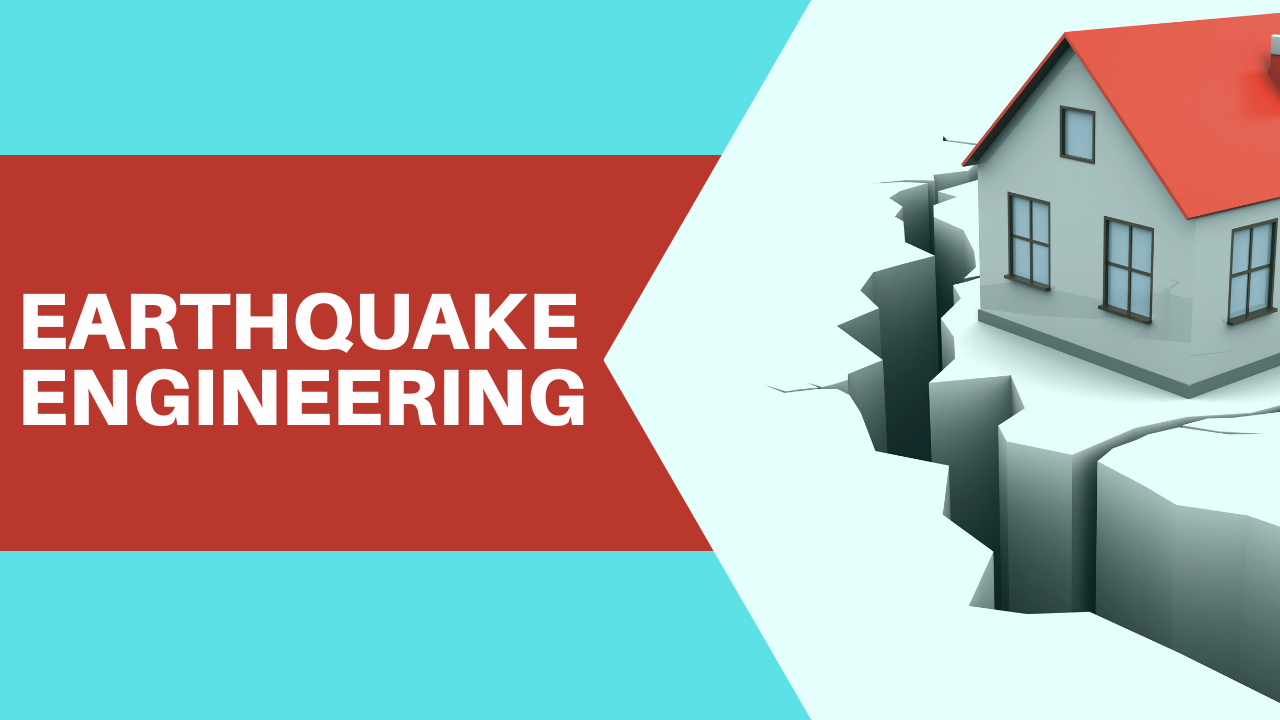Earthquake Engineering is the study of a multi-phased process, from finding the earthquake source to portraying the side effects and structural response and concluding the seismic protection measures. The objective of Earthquake Engineering is to help policymakers in reducing seismic hazards. Decisions or policymakers can be the organizations, agencies, or engineers working to be aware of and protect against seismic hazards through earthquake-resistant design.
This field analyzes structures like buildings, bridges, etc., keeping earthquakes in mind. It is a scientific field concerned with protecting the whole community, natural environment, ., and society from earthquake uncertainties by limiting seismic risk.
In this course, students learn about earthquake-resistant structures designed to withstand seismic effects while sustaining an acceptable level of damage. This particular course is a subset of geotechnical engineering, civil engineering, structural engineering, etc. Students study advanced computational tools such as GIS and DBMS that capture, analyze, and display seismic or tectonic data in seismic hazard assessment.
Why is Studying Earthquake Engineering Important?
Almost every country has faced the worst earthquakes. Their lives impact in many ways, like people who have become homeless across the globe. Before knowing the importance of earthquake engineering, we should try to answer questions like: How can civil or architectural engineers construct a building without considering earthquake effects in seismic regions?
An earthquake is a natural disaster that can occur anywhere in the world due to the movement of tectonic plates. To decrease the loss, the government in many countries started enlightening people about precautions from earthquakes by creating to promote earthquake engineering among students to produce expert civil engineers.
The study of earthquake engineering is important in every country because it can reduce the impacts of earthquakes like soil liquefaction, tsunami, and structural damage to buildings, bridges, highways, landslides, etc.
The earthquake engineering field proposes the unification of special seismic courses so that undergraduate engineers learn the basics of seismic codes and apply structural design principles correctly.
It is important to note that if architectural and engineering students learn these concepts clearly, then in the future, they can build structures that can minimize the damage through which they can save many lives and adverse effects when an earthquake strikes.
Topics Covered Under Earthquake Engineering
Earthquake engineering is a sub-branch of civil engineering, and the course aspirant is taught engineers to plan, design, construct, and manage earthquake-resistant structures. The earthquake engineering graduates work in the field to collect information from residents and in the research and development sector.
This course is divided into four semesters, and in the last semester, students go for industrial training.
The Themes that are Covered in this are:
- Ground Shaking Hazard
- Seismic Evaluation and Retrofitting of Structures
- Vulnerability and Risk Analysis
- Instrumentation and Model Testing Techniques
- The Vibration of the Elastic Method
- Earthquake Precursors and Early Warning Systems
- Seismic Disaster Mitigation and Management
- Design Response Spectrum
- Seismic Protection with Base Isolation
- Measurements of Earthquakes
- Seismic Code Provisions
- Seismic Hazard Assessment
Universities that offer Earthquake Engineering Courses
Almost every country provides quality civil engineering in their universities as a part of their curriculum. Universities offer undergraduate and postgraduate degrees in earthquake engineering with a focus on structural engineering and constructive orientation. Most popular universities that provide engineering are in countries such as the USA, New Zealand, UK, Canada, Australia, etc.
Universities that are known for their Top-Quality Earthquake Engineering Courses are:
- Stanford University California
- Imperial College London London, United Kingdom
- The University of Auckland Auckland, New Zealand
- The Pennsylvania State University Pennsylvania, United States
- Princeton University, New Jersey, United States
- The University of Sydney Sydney, Australia
- Osaka University Osaka, Japan
- University of Cambridge Cambridge, United Kingdom
- University of Canterbury Christchurch, New Zealand
- Berkeley University of California, California, United States
- University of Toronto, Ontario, Canada
- Princeton University, New Jersey
Challenges Faced by Earthquake Engineering Students
The approach to learning seismic engineering or earthquake engineering is applying seismic code requirements that may represent various problems for undergrad students.
Universities input various exams, dissertations, assignments, and projects to make students understand the seismic codes better and use the correct application of them in the future. But this course contains complicated themes or concepts that students need help understanding, like the seismic origin of code requirements that lead to wrong interpretations, because of which they generate ill structures and design solutions.
Most students drop out from the graduate level because they struggle to get proper training and understanding of seismic matters within a short period of a bachelor’s degree. These students do not analyse the dynamic structures, concepts, and seismic behaviours.
Conclusion
Earthquake Engineering reduces the risk more in towns and cities, especially in high-seismic countries. This field has many subjects that focus on every aspect (structural, mechanical, architectural, etc.) and helps students know the seismic effects and principles.



